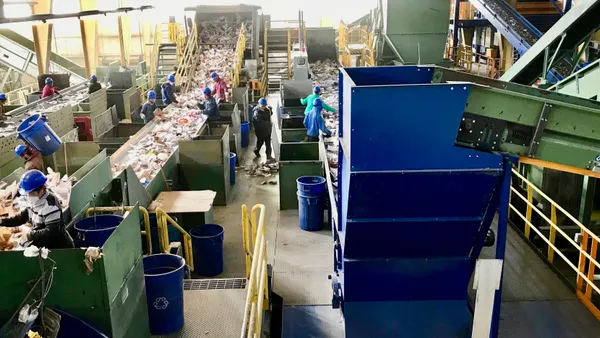Dive Brief:
- The city of Richmond in BC, Canada will begin diverting all of its organic material from the local Harvest Power facility as of Jan. 1 due to ongoing odor issues. The facility processes approximately 225,000 metric tons per year using composting and anaerobic digestion. Metro Vancouver, a regional government entity which includes Richmond, has already diverted 40,000 metric tons from the facility for similar reasons, as reported by the Vancouver Sun.
- Residents have made more than 1,200 odor complaints in the past year and Harvest Power CEO Chris Kasper reportedly said the facility hadn't been "a good neighbor" at a recent community meeting. Local officials have said the site isn't posing any immediate health risks.
- Metro Vancouver has announced plans to limit the facility's intake capacity if the issue isn't addressed within 90 days and Richmond has set a similar timeframe for odor mitigation. Harvest Power recently received an air quality management permit from Metro Vancouver which is valid until April 2020 but has appealed it due to "unreasonable, vague, arbitrary" guidelines on odor issues.
Dive Insight:
If the company can find a way to work with Richmond and Metro Vancouver on these issue it's possible that operations could eventually return to normal at the facility. Richmond's mayor is chair of the zero waste committee for Metro Vancouver, which enacted a ban on disposing organic waste in 2015, so he is well-acquainted with the importance of maintaining regional processing capacity.
Harvest Power is seen as one of the leaders in organics processing and it's not immediately clear how this could affect their business. As seen with the 2014 decision to close the Peninsula composting facility in Delaware, the permit renewal process was likely a factor in Metro Vancouver's decision to press the company on this issue. Recurring odors issues haven't been reported at the company's facility in Orlando, FL — which includes Disney World as a client — or other locations.
For many communities, whether justified or not, odor remains a big factor in opposition to hosting organics processing facilities. This can make organics collection programs more expensive for large cities with limited siting options and is a delaying factor in the national push to divert more organic material from landfills.










